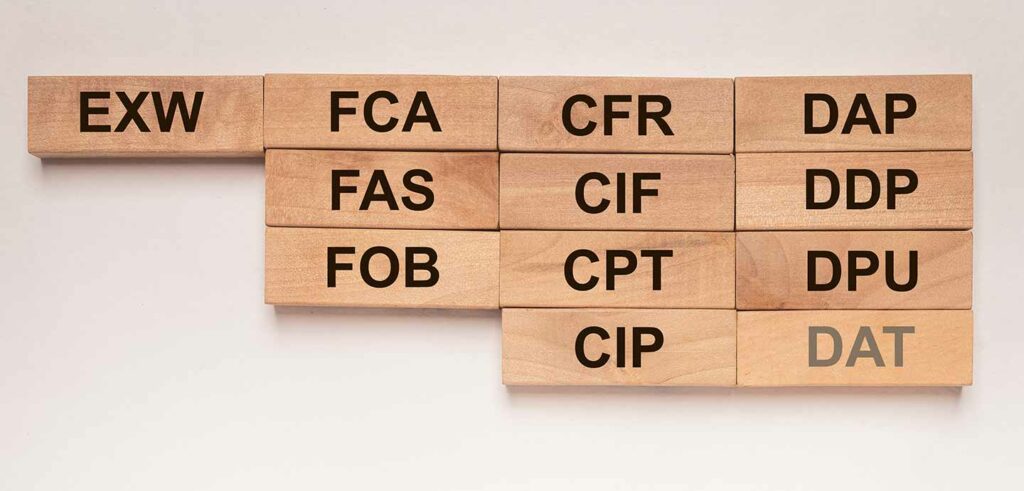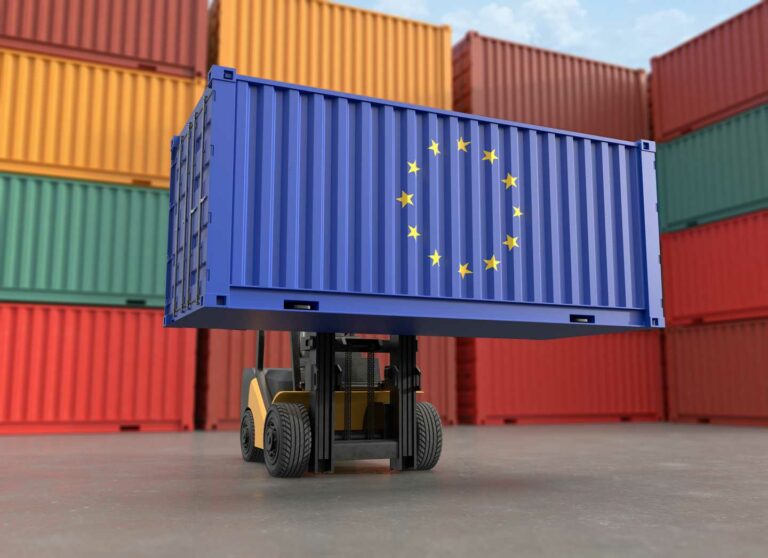Commercial operations at the international level follow a particular codification. These are “Incoterms” set up by the International Chamber of Commerce. This means “terms of international trade” also translated “international conditions of sale”.
Incoterms (link in French), or “International Commercial Terms” were created in 1936 by the International Chamber of Commerce. The Incoterms follow a precise codification and make it possible to regulate the obligations of the seller and the buyer within the framework of their international commercial operations.
What are the Incoterms?
They set the contractual rules between the supplier and the customer, optimizing economic exchanges.
An integral part of the sales contract, Incoterms define the obligations between the seller and the buyer; detailing among others:
- the place of departure of the goods,
- the place of delivery,
- the transportation costs,
- as well as the transfer of risks when arranging transportation.
Incoterms define the mode and means of transport. They also evolve over time and adapt to changes in international trade.
The International Chamber of Commerce has published, on January 1, 2020, the latest update of the Incoterms to use.
The objectives of the Incoterms codification
- To detail the distribution of delivery costs
- To determine the means of transport delivery (sea, road, air, rail, river or multimodal transport)
- To specify the level of responsibility shouldered by the buyer and by the seller
- To defining transportation risk transfer
- To specify the customs formalities applicable to exports and imports
- To calculate the customs value of taxation
All the obligations can be personalised according to the expectations and constraints of the parties. However, the Incoterms do not govern the transfer of ownership in any way. It is important to remember that these elements will impact:
- the sale price,
- the customs value upon importation,
- the amount of customs duties
- and the amount of Value Added Tax, if applicable.
So what are the current Incoterms?
There are 11 Incoterms codified as 3 letters:
- EXW: Ex Work
- FAS: Free Alongside Ship
- FCA: Free Carrier Alongside
- FOB: Free On Board
- CFR: Cost and Freight
- CIF: Cost, Insurance and Freight
- CIP: Carriage and Insurance Paid to
- CPT: Carriage Paid To
- DPU: Delivered at Place Unloaded (formerly DAT: Delivered At Terminal)
- DAP: Delivery At Place
- DDP: Delivery Duty Paid
We can group them as follows:
Multimodal transport
- EXW: The seller brings the goods in a designated place (factory, logistics platform or warehouse).
- FCA: The seller delivers the order to the carrier / consignee designated by the buyer.
- CPT: The buyer shoulders all costs that occur upon arrival.
- CIP: Same as CPT, the distinction is that the buyer takes care of the transport insurance.
- DAP: the seller takes care of all the transport to the place of delivery. He therefore assumes the risks and all the costs of transport to the final destination, while the costs of unloading and customs clearance on importation, the payment of duties and taxes will be borne by the Buyer.
- DPU (ex-DAT): the seller handles the transport to the place of destination and pays for the unloading. At the terminal, the recipient will take care of the import formalities and the payment of duties and taxes.
- DDP: the seller takes care of all transport, including import customs clearance formalities, including duties and taxes.
Maritime or river transport
- FAS: the buyer takes care of all the formalities during the crossing by ship, starting from the port of embarkation designated by him.
- FOB: the buyer takes charge of the goods from the moment they are loaded on the ship in the port of embarkation.
- CFR: the seller takes care of the delivery up to the port of arrival. He is no longer responsible for the goods once they have left the port of departure.
- CIF: the seller takes charge of the delivery of the goods to the port of embarkation on board the vessel. He is no longer responsible for the goods once they have left the port of departure.
When should Incoterms be defined?

When a company takes the first steps to prospect for a new supplier or during a call for tenders, it is important to choose the Incoterm. Once defined, it will allow the seller to build his pricing and the buyer to check his ability to take charge of the transport and customs clearance procedure for the goods.
It is essential to show the Incoterm in a sales contract, a call for tenders, an order form or an estimate. These contractual documents will define the obligations and rights of each party. This information may be used in the event of an operational or commercial dispute.
When drawing up a call for tenders, the buyers define the Incoterms themselves, thus allowing the control and management of costs with suppliers. The same is true for some manufacturers or traders based in Asia who prefer to use certain Incoterms in order to optimise logistics costs or even maintain commercial discretion.
As you will have understood, there is an Incoterm for each situation depending on the transport used: multimodal (any type of transport) or maritime. We also talk about the concept of arrival and departure. In order to help you with these notions, there is a mnemonic technique allowing you to easily understand the different Incoterms.
- Those starting with an E are departure incoterms. The lessee takes charge of all the transport and ancillary costs and the seller makes the goods available. For example: EXW.
- Those starting with an F are the incoterms whose transport will have to be mostly paid by the buyer. For example: FOB, FCA or FAS.
- Those starting with a C are the incoterms where the seller takes care of the majority of the transport. For example CIF, CIP or CFR.
- Those starting with a D are the incoterms of arrival. The supplier takes care of all the transport and sometimes, customs duties and VAT. For example: DAP or DPU.
In the context of international trade, it is recommended to be accompanied by professionals in order to understand the nuances and implications of the choice of Incoterms. Depending on whether transport insurance will be covered or not, Incoterms do not replace a contract of sale and do not deal with the transfer of ownership of goods sold.
Thanks to its expertise, ASD Group supports you in the implementation and operational management of your international flows.




